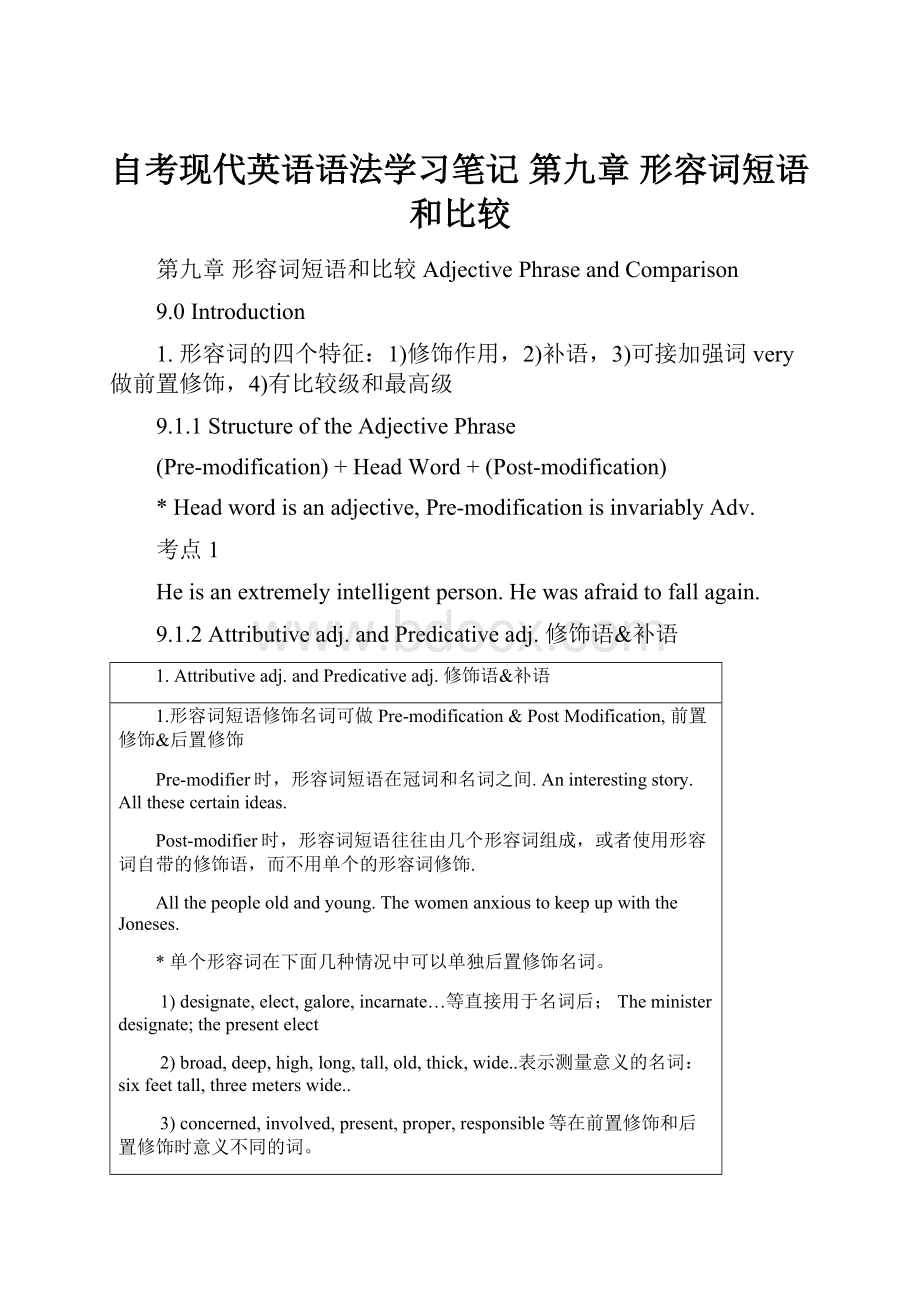自考现代英语语法学习笔记 第九章 形容词短语和比较.docx
《自考现代英语语法学习笔记 第九章 形容词短语和比较.docx》由会员分享,可在线阅读,更多相关《自考现代英语语法学习笔记 第九章 形容词短语和比较.docx(10页珍藏版)》请在冰豆网上搜索。

自考现代英语语法学习笔记第九章形容词短语和比较
第九章形容词短语和比较AdjectivePhraseandComparison
9.0Introduction
1.形容词的四个特征:
1)修饰作用,2)补语,3)可接加强词very做前置修饰,4)有比较级和最高级
9.1.1StructureoftheAdjectivePhrase
(Pre-modification)+HeadWord+(Post-modification)
*Headwordisanadjective,Pre-modificationisinvariablyAdv.
考点1
Heisanextremelyintelligentperson.Hewasafraidtofallagain.
9.1.2Attributiveadj.andPredicativeadj.修饰语&补语
1.Attributiveadj.andPredicativeadj.修饰语&补语
1.形容词短语修饰名词可做Pre-modification&PostModification,前置修饰&后置修饰
Pre-modifier时,形容词短语在冠词和名词之间.Aninterestingstory.Allthesecertainideas.
Post-modifier时,形容词短语往往由几个形容词组成,或者使用形容词自带的修饰语,而不用单个的形容词修饰.
Allthepeopleoldandyoung.ThewomenanxioustokeepupwiththeJoneses.
*单个形容词在下面几种情况中可以单独后置修饰名词。
1)designate,elect,galore,incarnate…等直接用于名词后;Theministerdesignate;thepresentelect
2)broad,deep,high,long,tall,old,thick,wide..表示测量意义的名词:
sixfeettall,threemeterswide..
3)concerned,involved,present,proper,responsible等在前置修饰和后置修饰时意义不同的词。
4)affected,available,required,suggested,等用在名词前后意义没有任何变化的词.Availableinfo/infoavailable.
2.除了修饰作用,形容词还可以当主语补语或者宾语补语.大部分名词具有这两种功能。
Alovelygirl/ThegirlislovelyAnoldcar/Thecarisold
2.Attributiveadj.
1.以下是基本上只做修饰语的adj.列表
1)–er结尾表示关系的名词:
elder,former,inner,latter,outer,upper…myelderbrother*who’selder?
×
2)增强形容词,包括强调(certain,definite,pure,sheer,plain)扩大(absolute,entire,extreme,perfect,total),减弱(feeble,sight)意义。
Aperfectidiot*theidiotisperfect×
3)限制所指范围的形容词:
chief,joint,lone,main,very,only,principle…
Thechiefproduce.*theproductischief×
4)科技,技术形容词:
chemical,coastal,earthen,nuclear,solar,wooden,woolen…
Thechemicalweapons.*theweaponsarechemical.×
5)表示方位的形容词:
downstairs,downtown,indoor,inside,outdoor,outside,upstairs…
Threeupstairsbedroom.
3.Predicativeadj.
1.以下是基本上只做修饰语的adj.列表
1)带后置修饰的形容词:
theshipisboundforAustralia*theboundshipforAustralia.
2)带前置A-(afraid,afloat,aghast,akin,alert,alight,alike,alive,alone,aloof,amiss,asleep,ashamed
Thechildisafraid.*Anafraidchild×
3)表示健康的形容词。
(faint,ill,poorly,well,unwell…
Thegirllookspoorly.*thepoorlygirl×
9.2形容词的语义分级
1.Stative&Dynamicadjective静态形容词&动态形容词
Stativeadjective
1.大多数形容词都是静态形容词,描述潜在的永恒的特征,尤其是修饰作用的形容词。
Abighouse,aredblouse,atallman
2.即使是做补语,大多数形容词也是静态的,所以一般与静态动词配合使用,一般不与进行体搭配。
Thehouseisbig.*thehouseisbeingbig.×
3.然而许多形容词可做动态意义使用,特别是他们做补语1.形容主语;2,表示临时状态时
Heisbeingfoolish.Sheisdeliberatelybeingrude.
进行体暗示形容词所描述的品质是可以人为控制的,是主观印象。
以下是可以做动态使用的形容词。
Ambitious,awkward,brave,calm,careful,careless,cheerful,clever,conceited,cruel,disagreeable,dull,enthusiastic,extravagant,faithful,foolish,friendly,funny,generous,gentle,good,greedy,hasty,helpful,impatient,irritating,jealous,kind,lenient,loyal,mischievous,naughty,nice,noisy,obstinate,patient,playful,reasonable,rude,sensible,serious,shy,slow,stubborn,stupid,suspicious,tactful,talkative,thoughtful,tidy,timid,troublesome,unfaithful,untidy,vain,vicious,vulgar,wicked,witty…
Gradable&Non-gradable可分级&不可分级
1.大部分的形容词是可分级的,inflectional或者是periphrastic,或者被加强助词very,so修饰
Bigbiggerbiggest/quite,rather,very,so,extremelybig
2.不可分级的形容词:
1)只做与物动词meter,latter,indoor2)表示起源,出处的形容词British,French…
3)绝对意义的形容词average,excellent,perfect,equal…
Inherent&Non-inherent表示内在意义和不表示内在意义
1.一般来讲,表示内在意义的形容词描述了名词的本身特征.Abighouse表示房子很大,Afirmhandshake表示握手很用力.
2.Noninherent,非形容词本身意思的。
Abigeater不是指eater本身很大,而是指饭量大的人.
Restrictive&Nonrestrictive限制性&非限制性
1.限制性形容词用描述名词与众不同特性的方式来指定名词。
Afatwomen.Fat指出了这个女人和其他女人不同之处-胖
2.非限制性形容词只是紧紧提供某些非关键信息,不足以来指定名词。
形容词修饰特有名词时不起限制作用。
Myfatwife.FoggyLondon,sunnyCalifornia
Marked&Unmarked有标志&无标志
Unmarked
Maked
Big,
Small
Heavy
light
Old
young
Long
short
Tall
short
习惯问句用unmarked形容词提问,要用markedadj提问的前提是句中已经提过所提问对象有此品质。
Yousayyourmotherisveryyoung,tellmehowyoungsheis.
考点2
9.3前置形容词的顺序问题
Determine
ZONEI
ZONEⅡ
ZoneⅢ
ZoneⅤ
HeadWord
The
IntensifyingAdj.
GradableAdj.
同时满足符合形容词特征的4个条件
Color&Participate
ColorbeforeParticipate
DenominalAdj.
不是由名词变形而来,就是名词本身充当形容词
A
e.g.:
boththelasttwonicebigoldroundredcarvedFrenchwoodencardtable.
ZONEⅡ:
同时满足符合形容词特征的4个条件。
当有好几个形容词时,遵循以下规则:
1.非变而来的adj.(small,old,thick)在变形而来的adj.(helpful,interesting)之前。
2.Subjectivemeasure+objectivemeasure(size,shape)+age
主观意志,想法+客观事实
Ahandsomeyoungman.(subjectivejudgment+age)
Ameanwealthyman.(Subjectivejudgment+objectivemeasurement)
ZoneⅤ:
E.g.:
anexpensivewoolencardinal.Amajortouristattraction.
9.4比较级ComparativeandSuperlative
9.4.1比较级变形
a.Regular规则变形
1.单音节形容词:
regular.Inflectedform:
-er/-est
2.双音节形容词:
Periphrasticform:
More-/Most-
3.双音节以-y,-er,-ure,-le,-ow结尾的形容词也可加-er/-est,(见下表)
*特别是y结尾的形容词(否定前缀也可使用此规则)happy-happierUnhappy-Unhappier
*clever-cleverer/moreclevermature-maturer/moremature
4.两个或者两个以上形容词一起使用,即使是是单音节形容词也可以加more,most
Sheismorekindandgentlethanhermother.
Sheiskinderandgentlerthanhermother.
5.由形容词变形而来以-ly结尾的副词比较级和最高级都是加–more/-most
SlowlyMoreslowlyMostslowly
QuicklyMorequicklyMostquickly
6.三音节或以上的都用periphrasticform.
ImportantMoreimportantMostimport
*双音节单词一般用periphrasticfrommore/most,注意以-y,-er,-ure,-le,-ow结尾的形容词也可以有inflectedform.
双音节单词
Inflectedform
Periphrastic
-y
Easy,silly
Easier/easiest
Sillier/silliest
Moreeasy,Mosteasy
Moresilly,Mostsilly
*双音节形容词或者以-y结尾的副词一般使用inflectedform,这些词加否定前缀-un时也成立。
除了Shy,sly
-er
Clever
Cleverer/cleverest
Moreclever,Mostclever
-ure
Mature,obscure
Mature/matures
Obscurer/obscurest
MoreMature,MostMature
Moreobscure,Mostobscure
-le
Gentle,simple
Gentler/Gentlest
Simpler/Simplest
MoreGentle,Mostgentle
MoreSimple,Mostsimple
-ow
Narrow
Narrower/narrowest
MoreNarrow,Mostnarrow
b不规则变形IrregularInflection
Adjective
Adverbs
Comparative
Superlative
Old
Older,elder
Oldest,Eldest
Good,well
Well
better
Best
bad
Badly
worse
Worst
Far
Far
Farther,further
Farthest,Furthest
little
Little
less
Least
Many,much
Much
more
most
9.4.2Usagenotes
a.Elder&Older
Elder/Eldest表示家庭关系中长辈的意思,只可以有形容作用(attributeposition),
Older/Oldest可做补语,可以指人也可以指物。
Sheismyelder/oldersister.
Sheis*elder(×)/olderthanme.
b.Farther&Further
都可以用来指物理距离,further/furthest可指抽象意义的距离。
Ican’tworkanyfarther/further.
Iftherearenofurtherquestions,Ideclarethemeetingclosed.
c.Less&Fewer
Less接不可数,Fewer接可数名词
d.lesser
作为形容词来用,只可以起形容作用,表示“notsoimportantorgreat”,不可与than连用
Toalesserextent.
e.the
与最高级配合使用,thebest,themost…
也可以用其他冠词来代替the,mybestfriend,ourmostimportanttask.
Most可以做为intensifiermeans“very”whengoeswithout“the”:
amostinterestingvisit.
The+比较级表示两个中级别较高的那个。
Heisthetallerofthetwo.
考点3
9.4.3comparativeconstruction
Positivedegree:
as…as
Comparativedegree:
more…than
Superlativedegree:
themost…
a.As…asNegativeform:
notas…as…notso…as…
1.*as后面可以是主语+(助词),非正式情况下,可以直接接主语。
MybrotherisastallasI(am).
Wedon’thaveasmuchtimeasJohn(dose).
2.adj和Nouns有两种位置关系,前置和后置。
JimisasqualifiedateacherasBob.
JimisateacherasqualifiedasBob.
Ican’tmoveasheavyaboxasthisone.
Ican’tmoveaboxasheavyasthisone.
*前置时,形容词在不定冠词+单数可数名词前。
*determiner限定词不可以后置,一般都在名词前面。
Icangiveyouasmanycopiesofthisbookasyouwant.(Many为determiner)
×Icangiveyoucopiesofthisbookasmanyasyouwant.(×)
3.As..as..结构三种用法:
(1)两个人或者事之间具有同样的品质,
(2)同一个人或者事两种不同品质的比较,(3)两个人或事之前两种不同的品质。
(1)Susanisasintelligentasherhusband.
(2)Susanisasintelligentassheisbeautiful.
(3)Susanisasbeautifulasherhusbandisintelligent.
b.More…than…
1.可加pre-modification:
far,even,many,much,still,alot,agreatdeal,rather,slightly…
2.adj和Nouns有两种位置关系,前置和后置。
Ourneighborhasalargerhousethanours.
Ourneighborhasahouselargerthanours.
Keenerboysthanheiswillbechosen.
Boyskeenerthanheiswillbechosen.
3.当两个被比较的物体不属于同一等级的时候,前置修饰不起作用,
Mr.Whiteisaprofessormuchmorelearnedthanhisstudents.
×Mr.Whiteisamuchmorelearnedprofessorthanhisstudents.
TherearealotofwomenmoreintelligentthanJohn.
×TherearealotofmoreintelligentwomenthanJohn.
*determiner限定词不可以后置,一般都在名词前面。
Helikestoordermorefoodthanhecaneat.
×Helikestoorderfoodmorethanhecaneat.
c.Themost
一般要用of+数字,in+地点,或者从句来limitthescopeofcomparison。
可是当最高级作为intensifier时候是可以不用limitthescope的~
I’dliketoexpressmydeepestgratitude…